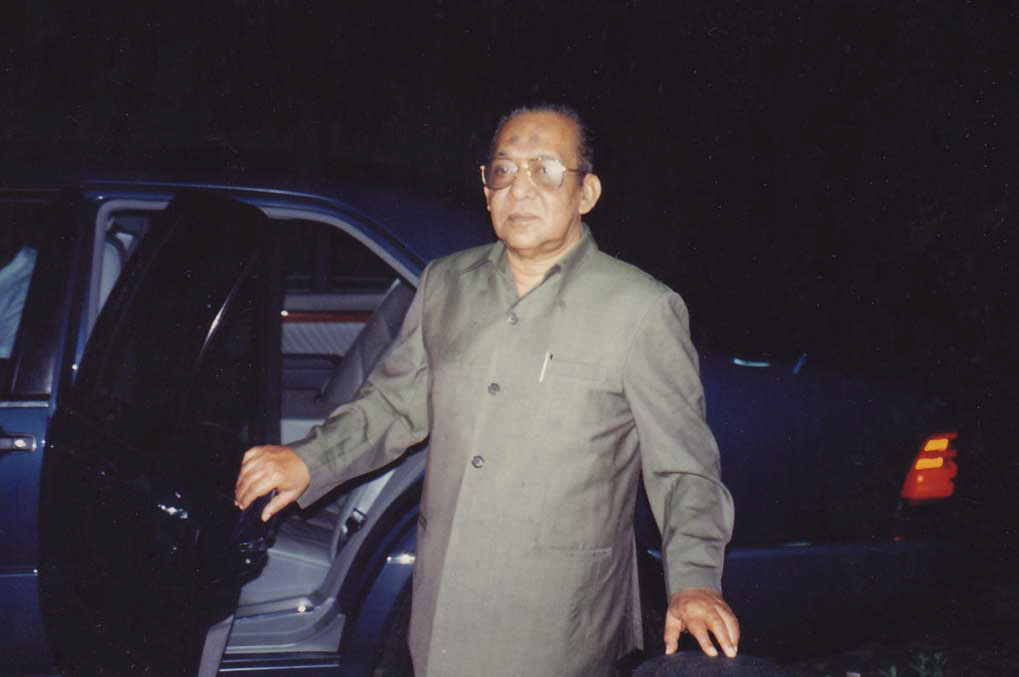AL HAJ M.I.M. NALEEM
A Brief Note of His Biography Family Background

Mohamed Ismail Mohamed Naleem called Hajji Naleem was born on 04th of April in 1933 in an extremely poor family which found it difficult to carry on its day to day existence. His father Mohamed Ismail who was a very pious person, passed away during his early childhood period. However, his mother Shareefa Umma who was a very pious and religious woman was able to bring him up among many hardships in a very pious environment.
Due to extreme poverty, he had to put an end to his studies with Grade Five (Primary Stages). He had only five years of schooling. As he has to meet the family expenses he was compelled to work as a labourer and underwent severe hardship in life.
IN THE FIELD OF TRADE AND COMMERCE
Beruwala is a place famous for gem merchants. Most of the people in Beruwala were engaged in cutting and polishing gems for the big merchants. Naleem felt that he couldn’t continue as a labourer. Therefore, gradually he learned the art of gem cutting and engaged in that field. After some times, he started trading gems in small scale with his little income. He was successful in his business and within the short period he was able to trade in expensive stones and built up a substantial capital. And very soon he attained the status of a very big gem merchant. If any stone is discovered in any part of Sri Lanka it was brought to him, because of his honesty and trustworthiness.
He brought about a revolution in gem business in Beruwala while it was the monopoly of few individuals. Naleem encouraged young people to take up to this trade, provided them with capital to buy gems, and very soon Beruwala became a famous city of gem trade due to his broad mindedness. Thus Naleem popularized this trade among the average men. His name as a gem merchant became well known not only in Sri Lanka but also in foreign countries. He established his business contacts with international gem merchants in Hong Kong, Japan, Germany, France, Belgium and other countries and he was very soon known as the Gem King of Sri Lanka.
In the year 1960 he performed his first Haj. Gradually he started his charitable activities in a very small scale by helping poor people, students to continue their studies, for orphans and also for building mosques. Very soon his charitable deeds became well known in Sri Lanka and people from every corner of Sri Lanka came to meet him seeking assistance. So much so that if any mosque was built in any part of Sri Lanka they first thought of Al Haj Naleem. Therefore, he established a special section for his charitable activities.
- For granting assistance to poor girls for their marriage
- Assistance to needy students to continue their studies
- Assistance to construct classrooms, libraries, science laboratories, medical centres in Muslim schools where these facilities were lacking.
- Assistance to orphans
- Assistance for building Mosques
Haji Naleem has great love for orphans. In Sri Lanka some Muslims established an orphanage by the name Makola Muslim Orphanage and this orphanage depended on monthly donations. Haji Naleem was one of the major contributors of these monthly donations. After some times these donations from various people were not forthcoming and the committee responsible for the orphanage came and informed Haji Naleem that they are faced with a situation of closing down of the orphanage. Haji Naleem was shocked to hear this and immediately he said “Prophet Muhammad (PBUH) was an orphan, and he had spoken highly about those who helped the orphans. Therefore, do not be worried, please find out a land so that I may buy it and put up a trust property as an income for the orphanage”. And true to his word he bought the land and built a trust property, which became the major source of income for the orphanage.

Al-Haj Naleem over the years became a national figure. He extended his assistance even to other communities and became a highly respected person all over Sri Lanka. In 1969 Mr. Dudley Senanayake the then Prime Minister of Sri Lanka invited Haji Naleem and requested to him to contest the parliamentary seat for Beruwala. But he declined this offer saying he has no political ambitions.
During the time of Prime Minister Madam Sirimavo Bandaranayake, Sri Lanka faced an acute foreign exchange crisis. At that time Haji Naleem donated to the Government 1.5 million Rupees and the Newspaper “Times of Ceylon” of 19 August 1974, wrote an editorial on it.
For so many years when the government of Sri Lanka did not give foreign exchange for Haj pilgrims he provided his own money as foreign exchange for the Haj pilgrims of Sri Lanka.
During this period, a commission was appointed by the government to look into foreign exchange violations false accusation was brought against Haji Naleem and he was taken to custody and was confined to a remand prison for about 40 days. Ultimately he was released free of any charge. During this period entire Muslim community of Sri Lanka protested against his arrest and prayers were held all over the island for his release. Mr. J.R. Jayawadane, former President of Sri Lanka who was then the leader of the opposition spoke in parliament about his arrest and the unfair treatment meted out to him in the prison.
“I am holding a brief to any body who is detained regard to whatever offence he has committed, but I know of one person who is now under detention. Mr. Naleem Hajiar who has the affection of the entire Muslim world. Why should that man be not allowed to see his lawyers, not allowed to see his relations? even a murderer, a person convicted of the murder of a Prime Minister of the country was allowed to see his lawyers, was allowed to see his relations, was allowed in the custody to live like a human being.

When President J.R. Jayawardane wanted to appoint him as member of the Greater Colombo Economic Commission he declined that offer. And on many occasions, successing governments wanted to confer National Honuors on him, but on all those occasions he declined.
Haji Naleem felt that the major problem of the Muslim community was lack of opportunities for education. Muslim schools lacked qualified science teachers and science laboratories. On the other hand the traditional Arabic Madrasas produced Ulema who are not educated on modern disciplines and because of that unable to provide guidance and leadership to the community. In order to fulfill this needs he established Jamiah Naleemiah and the Islamic Renaissance Movement.
